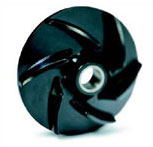Informationen über Thermoset molding

|
As opposed to thermoplastic resins, thermoset material has special characteristics basically due to its chemical cross-linkage during processing. Major properties and applications:, resistant to high temperatures, excellent chemical resistance, very good mechanical strength, good creeping behaviour, applications in the electrical/electronics industry, household and automotive industries, major thermoset materials are phenlic resins (PF), unsaturated polyester resins (UP), melamine resins (MF), melamine-phenolic resins (MP), urea resins (UF) and epoxy resins (EP) The major difference in processing thermoset and thermoplastic resins is the processing temperature. Thermoset melt is heated to approx. 70° C - 100° C and subsequently injected into an up to 150° C - 190° C heated mold. Aside from standard injection molding, Battenfeld offers two other processes for thermoset molding:, Injection compression molding : injection into a slightly open mold which is subsequently closed completely, Core compression : injection into a fully closed mold with embossing through one or more mold cores
|

